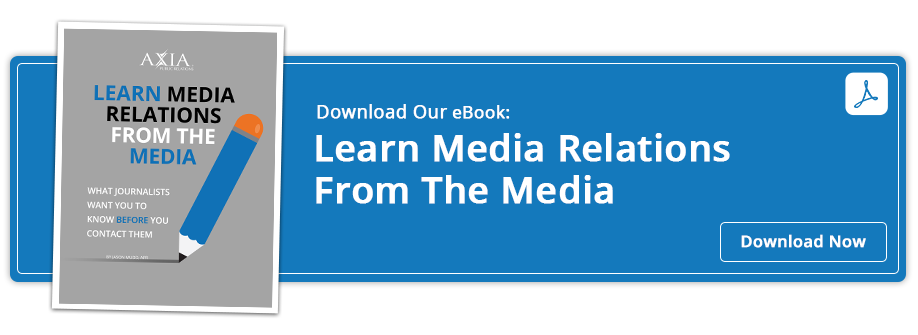 Ethical implications of using this favored PR tool
Ethical implications of using this favored PR tool
Several Axia Public Relation team members, including me, began our communications-based careers as journalists, serving as media gatekeepers. This added expertise often comes into play when counseling the clients we represent as public relations practitioners. We’re bound not only to the Public Relations Society of America Code of Ethics, but to the Society of Professional Journalists Code of Ethics. Each derivative, interestingly enough, shares a multitude of overlapping guidelines – one of which focuses on the use of the phrase “off the record.”
To those unfamiliar with the parlance, “off the record” is a public relations tool used by any individual (source) who wants to share information strictly as background or context when speaking with a member of the media. For example, if you were being interviewed by a local business journal reporter inquiring about rumors relating to your CEO’s failing health (which he did not yet want made public), you could responsibly share what you know after first saying, “Off the record...”
We professionals are beholden to ethical guidelines when using “off the record.” It relieves a source from identification and responsibility, yet the shared information is typically critical in not only discovering truth, but additional sources and salient facts that will ensure accuracy in a final news piece. Below are some important facts to understand before invoking “off the record.”
“Off the record” is a beneficial PR tool, but a journalist’s thorn.
Professional journalists are trained to understand that when a source (anyone willing to provide information about the topics on which you are reporting) uses “off the record” and the journalist acknowledges it, anything stated after that point is not for print or dissemination. The information shared under those circumstances is to provide context or background in order to assist a reporter in properly framing a news piece. Ethically, journalists are bound not to use any information shared “off the record” in news pieces once they’ve acknowledged that a source is invoking it.
If you don’t go back “on the record,” the journalist’s hands are tied.
The nature of “off the record” means that if you are being interviewed and forget to go back “on the record,” anything you say after your initial invocation of the tool is considered background only and not for public knowledge. Be thoughtful of when and why you use “off the record” because if you use it too wantonly, the media will no longer consider you a valuable source and will decline to use you at all.
In the digital realm, “citizen journalism” is on the rise.
Professional journalists are credentialed individuals who have not only pursued education on the craft at university, but ones who’ve earned their stripes through practical training. With the birth of millions of blogs, vlogs and “news” sites, the practice of ‘“citizen journalism” (anyone taking to the internet with a voice) has greatly increased.
Not every blogger, reviewer or writer is a journalist, meaning they are not bound by any defined code of ethics. They may not understand the rules of engagement as do professional journalists, so it is important to first know with whom you are speaking. Ask questions about your interviewer’s background and credentials if you are unsure. It’s prudent to ascertain this information before giving up company secrets when a “freelance writer from the Huffington Post” calls you and asks for comment.
Do your homework and properly prepare yourself and your spokespeople. Otherwise, “off the record” will be of little help should you divulge sensitive, private details to an internet troll posing as a journalist.
A journalist will tell you that her loyalty is first to her readers, followed closely by the sources that she so fiercely protects. To be a good source, it is important to know how to best support journalists so they can do the most efficient and honest job possible. Thoughtful, appropriate and only-as-needed use of “off the record” will keep your media relationships strong. To learn more about how to successfully engage the media, download Axia’s “Learn Media Relations from the Media” guide.

 Wendy Bulawa Agudelo has more than 15 years of experience in technology, business, consumer and non-profit public relations. In addition to serving on the Massachusetts Down Syndrome Congress PR Task Force, Wendy enjoys cooking and rooting for her favorite New England teams.
Wendy Bulawa Agudelo has more than 15 years of experience in technology, business, consumer and non-profit public relations. In addition to serving on the Massachusetts Down Syndrome Congress PR Task Force, Wendy enjoys cooking and rooting for her favorite New England teams.
Featured image credit: 123rf.com
Topics: public relations, media


Comment on This Article